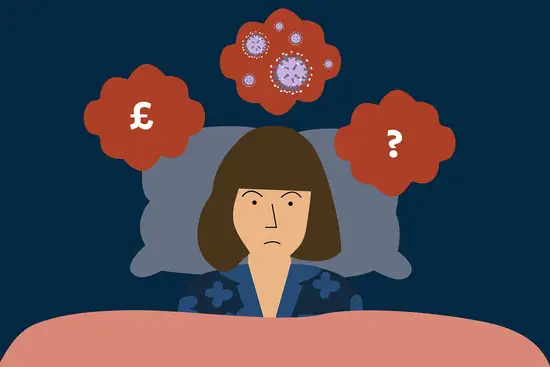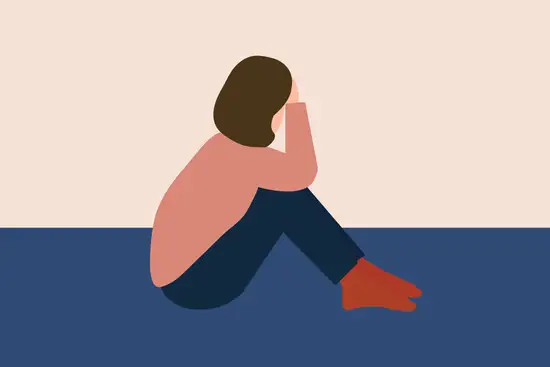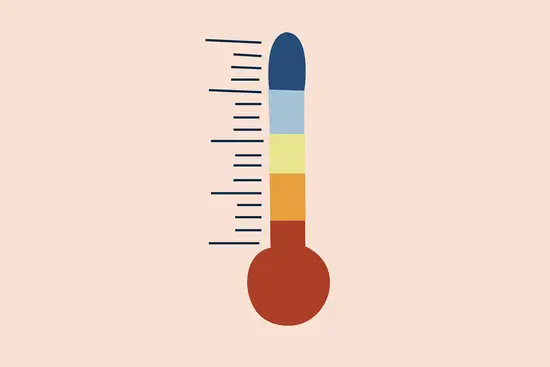Key points
The relationship between your sleep and mental health is extremely close but many of us aren’t aware of just how important getting sufficient quality sleep is for our mental and emotional wellbeing.
In this article we look at:
- how good sleep is key to regulating your mental health
- how your emotions are affected when you don’t get enough sleep
- how to safeguard your mental wellbeing by optimising your sleep
- what to do if you feel your sleep is impacting your mental health.
Sleep’s relationship with mental health
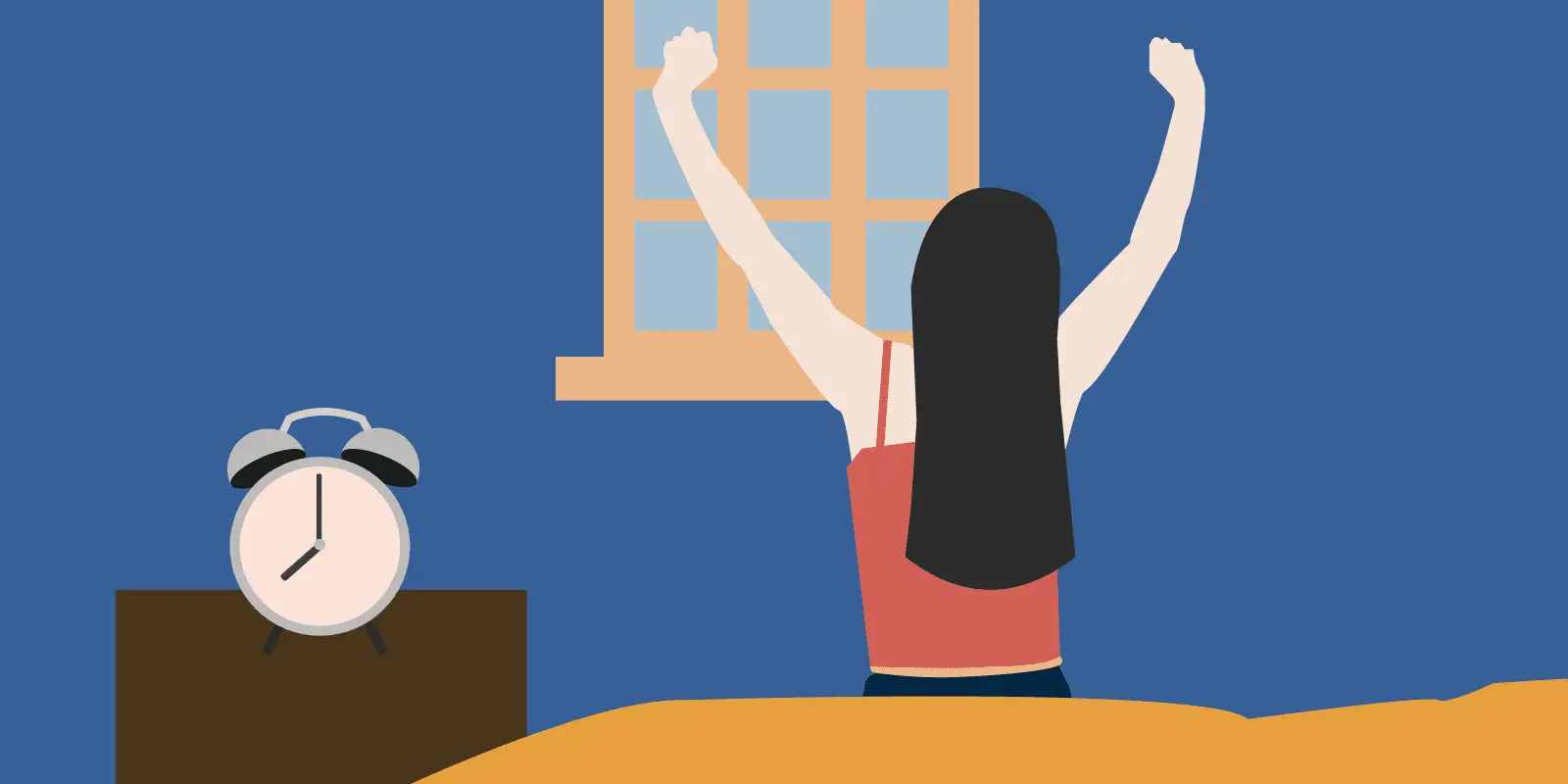
We often hear that good sleep is key to good physical health. Poor sleep is linked to the development of a range of physical health problems such as diabetes and heart disease. We hear much less about the relationship between sleep and mental health but it’s no less vital for maintaining your overall wellbeing.
According to the mental health charity, Mind, one in four people in the UK has experienced a mental health problem and there are many different aspects of a person’s life that can affect mental wellbeing.1
Sleep is a key aspect that can have a significant impact on mental wellbeing.
Poor sleep can affect how you feel, making you experience negative emotions more strongly and making everyday life a struggle. Conversely depression, anxiety and stress can all negatively impact on sleep.
There is a two-way relationship between sleep and mental health: taking good care of one can have the knock-on effect of improving the other.
Our resident sleep expert, Dr Neil Stanley hails sleep as a tried and tested means of restoring and optimising both physical and mental health. Research suggests that a rested mind is a healthier mind and if you’re sleeping better then you’re living better.
Sleep is so central to how our bodies and minds function by improving sleep you can actually improve many other conditions.
Dr Neil Stanley, Sleep Expert
Better sleep, better mental health
When your sleep suffers, your mental health often does too. Let’s make improving your sleep your first step towards feeling better emotionally and mentally. At Sleepstation, we combine expert guidance with proven techniques to help you:
- reduce symptoms of stress and anxiety
- lift your mood
- build emotional resilience
- sleep deeply and wake up clear-headed.
Start your journey to better sleep and better mental health today.
A mother’s story of losing sleep…and rediscovering it
Mother-of-two, Lilly, realised a lack of sleep was impacting her mental health when she started to snap at her two young sons. She struggled with her sleep at the height of lockdown as the perfect storm of uncertainty about the future, social isolation and home schooling created a sense of extreme anxiety and stress.
Lilly discovered Sleepstation following a conversation with a colleague. We were able to help fix her sleep within weeks and she continues to enjoy a better quality of life with her husband and sons.
Poor sleep negatively affects emotional wellbeing
Lilly’s situation probably sounds familiar to many of us. How many times have you found yourself grumpy and irritable after a poor night’s sleep?
It’s not just tired parents who find themselves snapping at loved ones or feeling overwhelmed by stress when they don’t get enough sleep. We can probably all think of times when a bad night’s sleep has left us feeling anxious, overwhelmed or quick to lose our temper the next day.
When we sleep well again, we see a rebound effect on our mood and we feel better-equipped to face the challenges of our day. Often, it’s only after a better night’s sleep that we can look back on our behaviour and see that we might have been a bit grumpier/shoutier/more emotional than usual when we were tired.
When you’re in the depths of sleep deprivation, you actually lose some of your ability to self-regulate your emotions.
The effects of sleep on your emotional wellbeing are quite complex and it’s only in more recent years that science has started to look closely at how the two affect each other.
It’s clear that lack of sleep leads to heightening of the intensity of certain emotions when we’re awake and then we react more strongly to negative stimuli.2Research has been able to validate that the balance between our positive and negative moods becomes very skewed towards the negative when we become sleep deprived.345
In one study, sleep deprived participants showed less intense and less frequent positive mood, while their negative mood increased in intensity.5Another study showed that two nights of partial sleep deprivation led to a decrease in reports of a variety of positive emotions but an increase in anxiety and catastrophising.5
So it’s clear that poor sleep quality increases our negative feelings while decreasing our positive ones.
The type of sleep matters as much as the amount
It’s important to get enough sleep to maintain your physical and mental health but the specific type of sleep is also important too.
Sleep studies that look at our brain waves during sleep have revealed a lot about the interplay between sleep and mental health.
Your sleep is made up of two basic types: rapid eye movement (REM) sleep and non-REM sleep (NREM). You cycle through NREM to REM and back again several times during the night.
REM sleep is the deepest sleep stage and it’s when most of your dreams occur. It’s an important stage for connecting memories together and processing of emotional experiences from during the day.
Getting enough quality sleep, particularly REM sleep, is essential for the brain to lay down new memories, make sense of emotions you’ve experienced during the day and keep your mental health in balance. When you don’t get enough sleep your brain finds it more difficult to process emotional experiences and you’re more likely to remember negative experiences than positive ones.
Sleep studies have shown that the two deepest stages of sleep tend to be affected in people who are experiencing mental health problems. In fact, research has shown that nearly all mood disorders are associated with alterations in REM sleep.3 When REM sleep is altered, your emotional regulation is compromised.
We know that slow wave sleep is important for feeling well-rested when you wake, so it’s not surprising that when this sleep stage is affected, you wake feeling groggy and your mental health can suffer as a consequence.
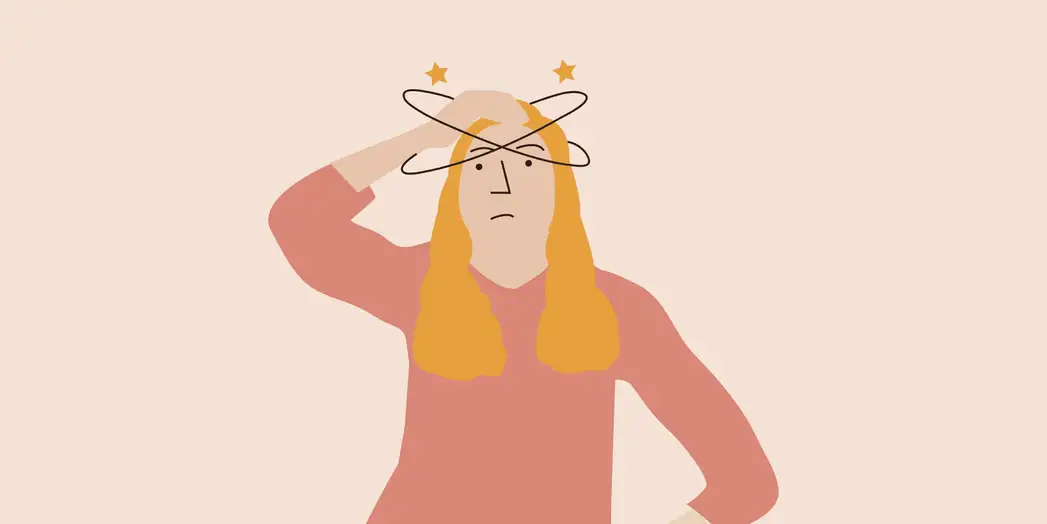
What’s happening in our brain when we’re sleep deprived?
Sleep deprivation specifically affects the amygdala, an area of the brain which acts as your emotional control centre.
In one study, participants were shown a range of images, starting with neutral images and progressing to increasingly negative images.3 The sleep deprived group showed vastly greater amygdala activation when shown the negative images compared to the well-rested group.
What this means is that their centre of emotional control was reacting much more strongly to the images. So negative things (in this study, images) feel much more intense when you’re deprived of sleep.
So let’s put this into context. Imagine a situation where someone accidentally spills a drink on something important like your phone.
‘Sleep deprived you’ may respond by being angry, shouting at the other person for being so stupid and clumsy and then spending the rest of the day in a bad mood.
Imagine the same situation after a good night’s sleep. The drink has spilled, it’s just an accident and we might even joke that the person who spilled it is a little clumsy. We can clean this up, it’s soon forgotten and life goes on.
These two scenarios illustrate how sleep deprivation can make us approach negative experiences differently when we’re rested.
Lack of sleep affects how you look and speak
Studies have also shown that we’re less expressive in our facial expressions,6 our speech shows less positive and more negative emotion7 and we struggle to interpret the facial expressions of those around us8 when we’re sleep deprived.
It doesn’t just end here either. Research has also shown us that people who are sleep deprived struggle with decision-making, complex reasoning and logical thought.9 10 11 12
So it’s clear that when you don’t get the sleep you need, it can take a huge toll on a whole range of your emotional responses and how your brain processes information.
In a nutshell, you can become both less skilled at rationally approaching a situation and more emotional, most particularly more negative, just by the act of not getting enough sleep.
The relationship between sleep and your emotions also flows the other way: not only does poor sleep lead to heightened emotions, your emotions can also impact on your ability to sleep.2 We’ll go into more detail about this side of the coin after Yvonne’s story.
Our emotions can disrupt our sleep
We’ve already discussed how poor sleep can impact how you feel, but what role can your emotions play in disturbing our sleep?
You can probably think of a time when something in your daily life made it hard to get to sleep. Maybe it was anxiety about an upcoming exam, sadness over the loss of a loved one or stress about work.
For these types of scenarios, the sleep disruption is short-term and resolves over time. But when someone is going through a prolonged period of stress, anxiety or depression, their sleep may be regularly disturbed and they become at higher risk of developing a sleep disorder.
The ‘life-changing’ effect of better sleep
Yvonne, from Chapeltown, experienced a deterioration in her mental health following a major trauma. Three decades of sleep problems left her exhausted and in desperate need of a resolution to her sleep problem.
For Yvonne, it was her experience of trauma that affected her mental wellbeing. This led to problems sleeping that ultimately resulted in more than three decades of sleep problems.
Being exposed to a traumatic event is very common, with upper figures suggesting that nearly 70% of adults and children have experienced a traumatic event.13
Exposure to a trauma can increase the risk of depression, stress, generalised anxiety disorder and post-traumatic stress disorder (PTSD), all of which have the potential to affect sleep.
We know that people with mental health problems including depression, anxiety and stress are at increased risk of developing sleep disorders such as insomnia.
Studies where participants were made to feel stressed before they went to sleep have found that it took longer for them to fall asleep, they woke more often during the night and they didn’t sleep as well or as long as the unstressed group.14 15
REM sleep is often disrupted when we’re experiencing stress.16 17 In stressed participants, the amount of REM sleep was lower and there were more awakenings from REM sleep than in the unstressed groups.
Anxiety has also been identified as a major risk factor for insomnia18 while depression is thought to affect some 300 million people across the globe. It’s understood that 75-90% of people with depression also experience insomnia.
So what is it about stress, anxiety and depression that disturbs our sleep?
Being stressed or anxious can lead to a state of hyperarousal when you try to fall asleep. This leaves you alert and awake. This arousal is often due to the body producing lots of stress hormones, such as adrenaline and cortisol, which cause your heart to pump faster, your respiration rate to rise and your alert level to heighten.
When someone experiences chronic stress, their cortisol levels remain constantly elevated and this can make it hard to sleep day after day. When this continues unchecked, the person can then develop insomnia.
Depression and insomnia both affect each other. Insomnia can increase feelings of depression and depression can lead to insomnia. There’s a large amount of research into the relationship between the two and we also know that treating one can have a positive impact on the other.
So by addressing a sleep problem you can expect to see improvements in mental wellbeing and vice versa.
Improve your sleep to improve your mental health
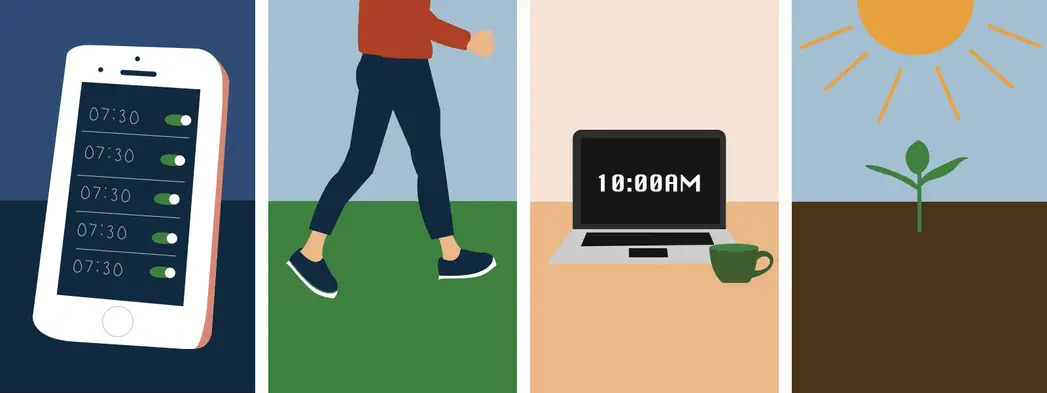
It’s clear there’s a bidirectional relationship between sleep and mental health. So if you take steps to improve your sleep, you should see improvements in your mental wellbeing.
These don’t have to be giant steps — there are many simple changes you can implement to optimise your sleep without making major changes to your life.
We’ve compiled a list of 10 steps that can help you to improve your sleep:
- Keep a consistent bedtime and wake time. Sleep loves routine, so if you can get up and go to bed at the same time each day, that’s a good starting point.
- Spend some time outside. Getting exposure to sunlight helps to set your body clock, which is important in telling your body when it’s time to sleep. Spending time outside can also help to boost your mood. Sitting by a sunny window will not have the same effect!
- Exercise! You can either tie this in with getting exposure to sunlight, or find another way to include some exercise in your day. Either way, exercise helps us to create a sleep need, and will help your body to feel tired when it’s time for bed. It’s also another great mood-boosting activity.
- Try not to nap. Sleeping during the day will generally make it harder to fall asleep at night.
- Avoid caffeine, alcohol, nicotine and other stimulants close to bedtime. These can all leave you feeling more awake at bedtime and can disrupt sleep.
- Consider creating a wind-down routine, in which you follow roughly the same steps each evening to prepare yourself for sleep.
- Avoid screens in the evening. TV, tablet, smartphone, computer… it doesn’t matter which. All of these omit blue light which can disrupt your sleep. Try to set a cut-off time for when you stop looking at these.
- Make sure your bedroom is a place of calm and rest. There are several ways to create the ideal bedroom setup, from making sure it’s ultra dark to choosing the correct bedding.
- Manage stress and anxiety. Don’t take these to bed with you. Try to make time to destress before bed.
- If you worry about getting to sleep or waking in the night, you might want to consider thought blocking techniques to clear your mind of anything that’s coming between you and sleep.
Ideally, you want to be going to bed when you’re sleepy and not before. If you can’t sleep after about 30 minutes, or you wake in the night and it’s taking you longer than 20 minutes to get back to sleep, then it’s a good idea to get up and go and do something relaxing somewhere else for a while. When you start to feel sleepy, go back to bed.
Sleep better with our support
If you’re having difficulty sleeping and it’s affecting your mental health, our team, including experienced sleep coaches, clinicians and sleep experts will help you identify the underlying causes of your sleep problem and provide the personal support you need to improve your sleep.
We deliver remote care with a personal touch and that’s what makes our service so effective. Let’s start fixing your sleep problem today.
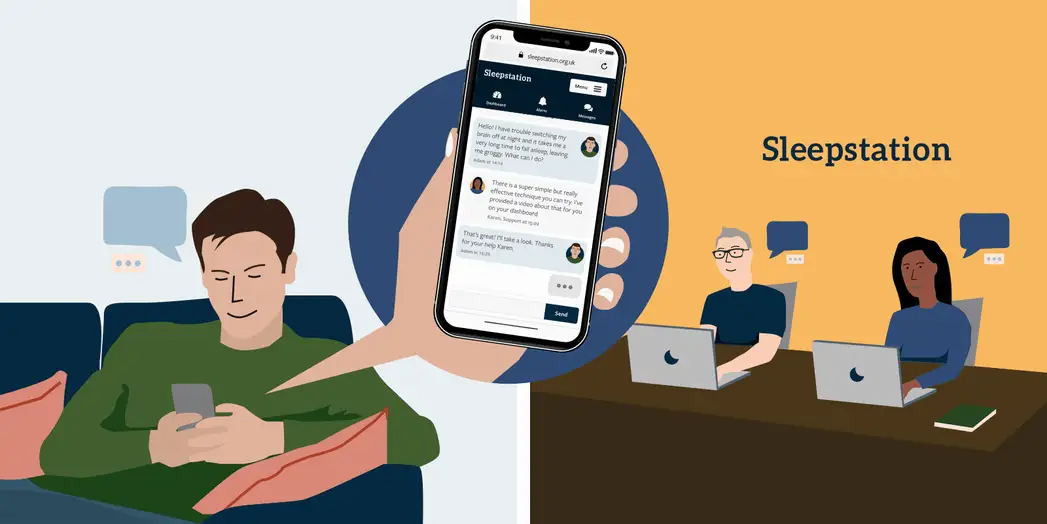
Summary
- Your sleep and mental health go hand in hand.
- Poor sleep can adversely affect your mental wellbeing.
- Depression, anxiety, stress and other mental health conditions can all lead to developing a sleep disorder.
- Simple changes to your daily routine and sleep environment may help improve your sleep.
- Improving your sleep can benefit both your physical and mental wellbeing.
References
- Understanding mental health problems. mind.org.uk. Available here. (Accessed 10 Aug 2023). ↩︎
- Kahn M, Sheppes G, Sadeh A. Sleep and emotions: bidirectional links and underlying mechanisms. Int J Psychophysiol 2013;89:2–28. ↩︎
- Yoo S-S, Gujar N, Hu P, Jolesz FA, Walker MP. The human emotional brain without sleep–a prefrontal amygdala disconnect. Curr Biol 2007;17:R877-8. ↩︎
- Paterson, J.L., Dorrian, J., Ferguson, S.A., Jay, S.M., Lamond, N., Murphy, P.J., Campbell, S.S., Dawson, D., 2011. Changes in structural aspects of mood during 39–66 h of sleep loss using matched controls. Applied Ergonomics 42, 196–201. ↩︎
- Talbot, L.S., McGlinchey, E.L., Kaplan, K.A., Dahl, R.E., Harvey, A.G., 2010. Sleep deprivation in adolescents and adults: changes in affect. Emotion 10, 831–841. ↩︎
- Minkel J, Htaik O, Banks S, Dinges D. Emotional expressiveness in sleep-deprived healthy adults. Behav Sleep Med 2011; 9: 5–14. ↩︎
- McGlinchey EL, Talbot LS, Chang K-H, Kaplan KA, Dahl RE, Harvey AG. The effect of sleep deprivation on vocal expression of emotion in adolescents and adults. Sleep 2011; 34: 1233–1241. ↩︎
- van der Helm E, Gujar N, Walker MP. Sleep deprivation impairs the accurate recognition of human emotions. Sleep 2010; 33: 335–342. ↩︎
- Harrison Y, Horne JA. The impact of sleep deprivation on decision making: A review. J Exp Psychol Appl 2000; 6: 236–249. ↩︎
- Alhola P, Polo-Kantola P. Sleep deprivation: Impact on cognitive performance. Neuropsychiatr Dis Treat 2007; 3: 553–567. ↩︎
- Killgore WDS. Effects of sleep deprivation on cognition. Prog Brain Res 2010; 185: 105–129. ↩︎
- Krause AJ, Simon EB, Mander BA, Greer SM, Saletin JM, Goldstein-Piekarski AN et al. The sleep-deprived human brain. Nat Rev Neurosci 2017; 18: 404–418. ↩︎
- Babson KA, Feldner MT. Temporal relations between sleep problems and both traumatic event exposure and PTSD: a critical review of the empirical literature. J Anxiety Disord 2010;24:1–15. ↩︎
- Gross RT, Borkovec TD. Effects of a cognitive intrusion manipulation on the sleep-onset latency of good sleepers. Behav Ther 1982; 13: 112–116. ↩︎
- Gemain A, Buysse DJ, Ombao H, Kupfer DJ, Hall M. Psychophysiological reactivity and coping styles influence the effects of acute stress exposure on rapid eye movement sleep. Psychosomatic Medicine 2003; 65: 857–864. ↩︎
- Vandekerckhove M, Weiss R, Schotte C, Exadaktylos V, Haex B, Verbraecken J. The role of presleep negative emotion in sleep physiology: Presleep negative emotion in sleep physiology. Psychophysiology 2011; 48: 1738–1744. ↩︎
- Kim E-J, Dimsdale JE. The effect of psychosocial stress on sleep: a review of polysomnographic evidence. Behav Sleep Med 2007;5:256–78. ↩︎
- LeBlanc M, Mérette C, Savard J, Ivers H, Baillargeon L, Morin CM. Incidence and risk factors of insomnia in a population-based sample. Sleep 2009;32:1027–37. ↩︎
